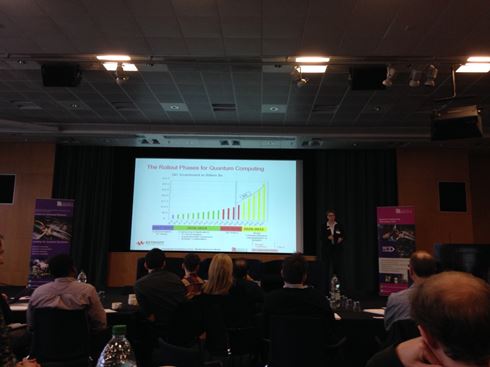
By Michael Banks
Are we on the verge of a “quantum 2.0” revolution?
That was a question raised yesterday at an event that I attended at HP Labs in north Bristol, which was organized by the University of Bristol.
The day-long meeting featured a series of talks from industry about how quantum technologies are affecting business.
Quantum physicist Mark Thompson from the University of Bristol kicked off the event, highlighting three main applications where quantum technologies are having a major impact: computing, communications and sensing.
His group is focused on integrated quantum photonics and is building a photonic-based quantum computer as well as working on a quantum-communications network in Bristol that could result in a Bristol–London–Cambridge link.
Thompson noted how his university is inspiring a generation of quantum engineers by supporting 50 PhD students over an eight-year period through the UK’s £270m National Quantum Technologies Fund.
It is hard to talk about quantum technology and not mention quantum computers. Niki Haines, a programme manager at Keysight Technologies – a firm that provides electronic measurement technologies – says that cloud computing, 5G communication and the “Internet of things” will all need quantum technologies.
Haines was not shy to offer some predictions, saying that quantum computers could be “rolled out” by 2025, with broad commercialization from 2030. People I talked to at the meeting largely agreed, but cautioned that such a quantum computer would probably be tailored to tackling very specific problems.
Nick Crew, operations manager at Airbus, called quantum technologies “disruptive” and said they will “open up new markets”. He noted that Airbus is interested in using quantum technologies in defence, including for secure communications as well as in sensing, which is much more mature technology. “We want to use these technologies to differentiate our products,” he says.
Another firm big on communications and quantum sensors is the US company Gooch and Housego, which builds photonic components such as lasers. Murray Reed, chief technology officer at the firm, which employs around 700 people in the US and the UK, says they have worked with the UK firm e2v to supply laser systems for satellites. “We are a bridge from the universities to the larger companies,” says Reed.
It was clear from the day that there is a lot of activity worldwide in developing quantum technologies – and a lot of interest in how the science can be commercialized and how it can set products apart.
But as Mustafa Rampuri from the University of Bristol points out, while the UK is at the top when it comes to basic research, the country needs to be much better when it comes to commercializing those breakthroughs.



